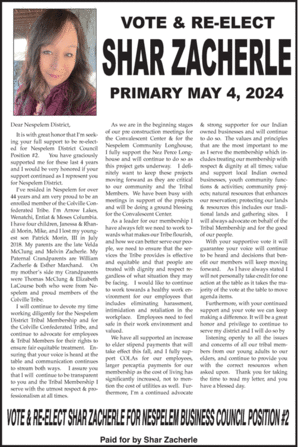Bob Morton represented his people unconditionally
Last updated 8/19/2015 at 10:16am
Imagine rolling into Olympia in your travel trailer each year for the start of the legislative session knowing your district has the highest unemployment in the state and the lowest average annual wage. Folks in your sprawling rural 7th District earn between $15,000 and $20,000 less than the state average wage.
Stevens, Pend Oreille, Ferry and Okanogan counties are rich in minerals and have abundant forests and natural public grazing lands, but over the years mining, logging and lumber mill jobs dried up, in large part due to government regulations and restrictions.
Imagine that your constituents ask you, “Why don’t the folks in Seattle understand that we need jobs to support our families? We have a very different economy in northeast Washington!”
Bob Morton, a soft-spoken and gentle Methodist minister, served in the Washington State Legislature for 22 years. He never lost sight of the fact that one in 10 people in his district did not have a job.
Morton, who died on Aug. 6, grew up on a dairy farm, was a rancher, logger, bush pilot, and cloud seeder, as well as a minister. He was a humble man who always had a kind word for people, regardless of whether he agreed with them or not.
He got into politics because he wanted to serve the people. Bob Morton didn’t run for the legislature so he could leverage his office to make friends in high places who could help him further his political career.
Morton thought about running for public lands commissioner only because of the vast amount of government-owned land in that part of Washington. It troubled him that government supplanted logging, mining and farming as the district’s main employer.
He believed that putting people to work in the private sector produced the tax dollars that would provide the funds for schools, roads, fire protection and law enforcement.
Morton saw what was happening to rural counties, especially when the Obama Administration cut payments to timber-dependent rural counties – dollars meant to replace the income from logging on U.S. Forest Service lands.
During his time in the Legislature, he saw timber sales on state forests dwindle even as a majority of the northeast Washington forests got hammered by the mountain pine beetle. He was perplexed because, rather than salvaging the dead trees and milling them, they were left strewn across the landscape — tinder for the next large wildfire.
Morton got so frustrated that he and former Spokane Senator Bob McCaslin, a fellow Republican, led a movement to create a 51st state. The state would be called Lincoln and would include eastern Washington and northern Idaho.
Lincoln never happened and Bob Morton retired in 2012 to minister to his friends at Orient Community Church near Colville.
Bob Morton wasn’t a headline grabber or flamboyant. He was a public servant in the truest sense of the word, because he deeply believed that he was elected to do the people’s work.
He was mentor to Cathy McMorris Rodgers, who is the fourth highest-ranking Republican in the U.S. House of Representatives and the highest-ranking woman in Congress’ majority party.
She was Morton’s legislative campaign manager and legislative assistant in Olympia.
McMorris Rodgers recalled that Bob Morton led by example. He always told her to listen, listen, listen some more, learn, and then lead. “That’s the way he approached things,” she said in a recent Spokane Spokesman Review article.
Good advice. Wouldn’t that be refreshing in politics today?
Don C. Brunell is a business analyst, writer and columnist. He recently retired as president of the Association of Washington Business, the state’s oldest and largest business organization, and now lives in Vancouver. Contact him at theBrunells@msn.com.



Reader Comments(0)